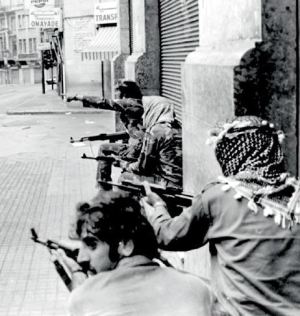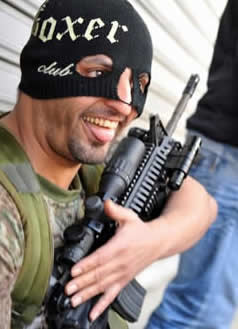In an interview with Asharq al-Awsat, Siniora said: "When we rely on solid ground, all the Lebanese will support the negotiating team."
But he cautioned that if the new demands were not legally established, negotiations could extend for years and be delayed, allowing Israel "to take advantage of our wealth."
Indirect negotiations with Israel, under the auspices and mediation of the United States, stopped after four sessions held at the UN headquarters in Ras Naqoura in the far south-west of Leb
 ...an Iranian colony situated on the eastern Mediterranean, conveniently adjacent to Israel. Formerly inhabited by hardy Phoenecian traders, its official language is now Arabic, with the usual unpleasant side effects. The Leb civil war, between 1975 and 1990, lasted a little over 145 years and produced 120,000 fatalities. The average length of a ceasefire was measured in seconds. The Lebs maintain a precarious sectarian balance among Shiites, Sunnis, and about a dozeen flavors of Christians. It is the home of Hezbollah, which periodically starts a war with the Zionist Entity, gets Beirut pounded to rubble, and then declares victory and has a parade. The Lebs have the curious habit of periodically murdering their heads of state or prime ministers...
...an Iranian colony situated on the eastern Mediterranean, conveniently adjacent to Israel. Formerly inhabited by hardy Phoenecian traders, its official language is now Arabic, with the usual unpleasant side effects. The Leb civil war, between 1975 and 1990, lasted a little over 145 years and produced 120,000 fatalities. The average length of a ceasefire was measured in seconds. The Lebs maintain a precarious sectarian balance among Shiites, Sunnis, and about a dozeen flavors of Christians. It is the home of Hezbollah, which periodically starts a war with the Zionist Entity, gets Beirut pounded to rubble, and then declares victory and has a parade. The Lebs have the curious habit of periodically murdering their heads of state or prime ministers..., when the Lebanese side raised the ceiling of its conditions, demanding an additional 1,430 nautical kilometers, while the initial demand was limited to 860 kilometers.
The Lebanese negotiating delegation announced a few weeks ago that it would not resume talks without amending the decree that the Lebanese government deposited at the United Nations
...the Oyster Bay money pit...
in 2010, describing it as "our weapon to win the negotiations."
Siniora explained the demarcation path since 2007, saying that Lebanon signed an agreement with Cyprus on January 17, 2007, without specifying the triple points in the north and the south, because of hostility with Israel and Damascus's rejection of a joint demarcation of the border in the north.
The agreement stipulated that no party could take an additional step without the approval of the third party, and accordingly, the Lebanese side individually demarcated its borders, Siniora noted, stressing that the move had no legal value because it was made on a unilateral basis.
In contrast to the agreement with Lebanon, Cyprus made a unilateral move and concluded an agreement with Israel on December 17, 2010, without consulting the Lebanese side. The former premier noted that Tel Aviv has deposited its borders as it sees fit, with the triple point with Cyprus, in the United Nations. The government of Prime Minister Najib Mikati objected to that agreement on June 20, 2011, because it contravened Point 23 that the second Siniora government had set in 2008.
"I am afraid that we will have another Shebaa Farms in the sea," Siniora said, referring to disputed land in the Israeli-occupied Golan Heights.
He continued: "When our rights are legally established, and we have solid ground to prove them, then we must all support the amendment of the decree," demanded by the negotiating delegation.

 Lebanese Druz leader Walid Jumblatt says the language used against Iran, which put Tehran on a similar level of hostility as Israel, was "mistaken".
Lebanese Druz leader Walid Jumblatt says the language used against Iran, which put Tehran on a similar level of hostility as Israel, was "mistaken".  Hezbollah on Saturday denied having fired a rocket from Lebanon that hit northern Israel earlier in the day, lightly wounding two people.
Hezbollah on Saturday denied having fired a rocket from Lebanon that hit northern Israel earlier in the day, lightly wounding two people.  Exiled Hamas supremo Khaled Meshaal has called for a thaw in ties between Saudi Arabia and Syria during a recent visit to Gulf kingdom, an Arab diplomat said on Sunday. "During meetings with Saudi officials, Meshaal raised the issue of Saudi-Syrian relations, which have long been tense, and stressed the importance of improving those ties," the diplomat told AFP, requesting anonymity.
Exiled Hamas supremo Khaled Meshaal has called for a thaw in ties between Saudi Arabia and Syria during a recent visit to Gulf kingdom, an Arab diplomat said on Sunday. "During meetings with Saudi officials, Meshaal raised the issue of Saudi-Syrian relations, which have long been tense, and stressed the importance of improving those ties," the diplomat told AFP, requesting anonymity.  An imam was killed and five people wounded in a gun battle between rival communities in a village in northern Lebanon on Sunday, a security official said.
An imam was killed and five people wounded in a gun battle between rival communities in a village in northern Lebanon on Sunday, a security official said.